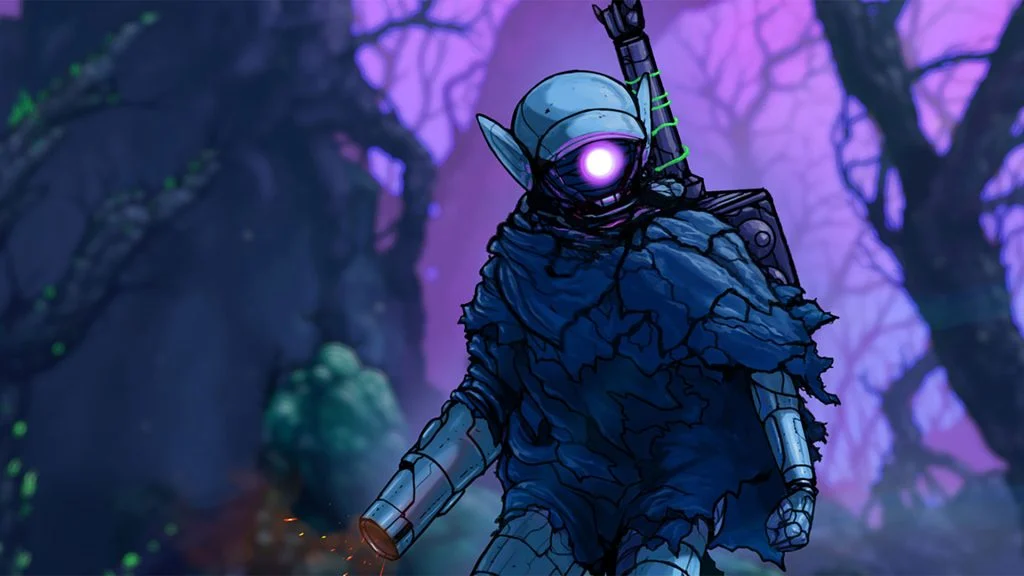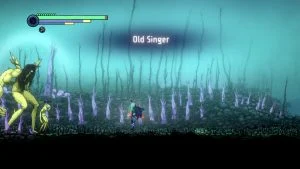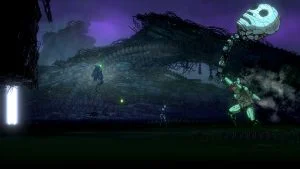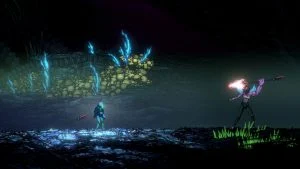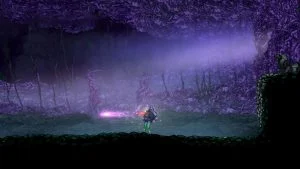Ghost Song, developed by Old Moon and published by Humble Games, is a mash-up of Metroidvania and Soulslike mechanics.
Ghost Song started as an indie project funded back in 2013. It was a time when Nintendo had seemingly given up on Metroid, and thus one of the cornerstones of the genre had gone dark. While the devs pointed to Dark Souls as their other major source of inspiration, I can’t help but wonder if that cemented the game’s tone.
In Ghost Song, players take control of a long-dormant Deadsuit on Lorian V. She can’t remember much from before. Most of the life left on the moon is too busy trying to kill her to jog her memory. She finds the survivors of the shipwrecked Gambler and is tasked with retrieving the parts to restore her.
Explore and Improve
Most of Lorian V starts locked off behind barriers and jumps that Blue can’t (yet) make. As story bosses fall, they give Blue tools that open up the world to better explore. Ghost Song is clear about where to go to advance the story and even offers some areas that can be tackled in different orders. The increasing difficulty is a firmer push in a certain direction. Though as I found out with Liselle Tal near the starting area, being stubborn can pay off.
Some power-ups are hidden behind breakable walls, and others are teased beyond tricky jumps. Most of the former have environmental clues, though, and it only takes one shot to confirm a wall can break. Some games in this genre feel too big and their secrets too-well hidden, but Ghost Song is more reasonable.
The combat system leans more toward the Metroid side. Battles are a mix of platforming around enemies and attacks before lining up one or several shots. The mechanic of blaster barrel heat encourages aggressiveness with both shooting and striking, and it’s a clever way of adding melee combat.
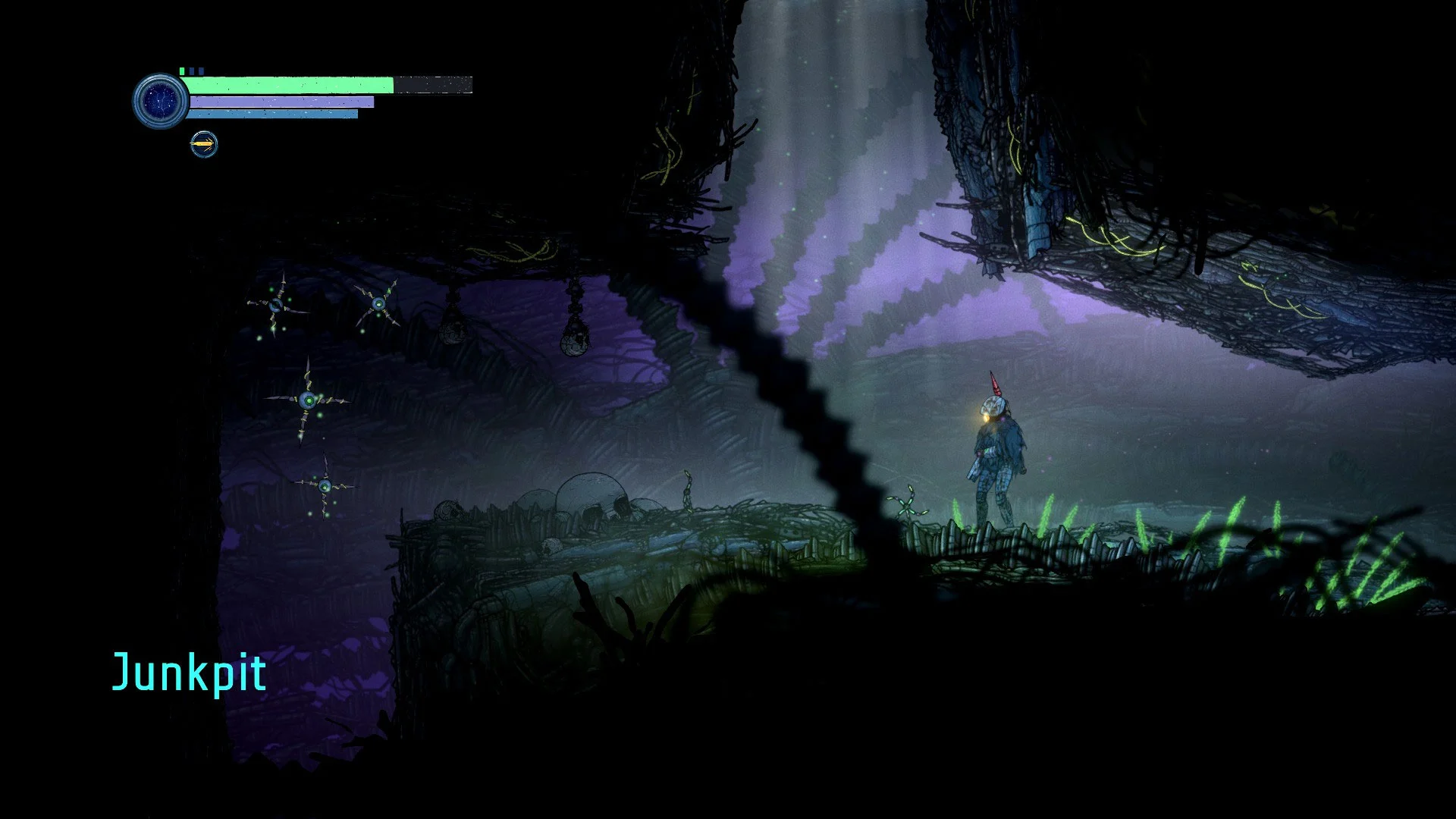
On top of the map-openers, there are modules for the suit, more for the blaster, and even some special weapons. This is one place the soulslike mechanics are a definite boon; granting players more choice in how they play. I’d usually play this genre more defensively, but it turns out I love all-or-nothing melee swings. Enough to eat a few deaths trying for big damage on a tough boss.
New ways to jump and dodge also means more interesting attack patterns and platforming challenges. And the backtracking I originally disliked ended up showing how much stronger I’d gotten. Not just in how fast I could clear the enemies but in how fast I could move through the rooms I’d once stumbled through.
Kills and certain items grant nanogel, which Blue can use to level up her stats. There are only 3 stats, and most of Blue’s power comes from her equipment. Said equipment isn’t stat-locked and often grants its own stat boosts. I didn’t have to worry about ruining my build by accident. This meant I could experiment when bosses like Kellunhelk and his friend smeared me across the walls. I wasn’t locked into “do it again, but better.”
Blue drops nanogel on death, though, which needs to be retrieved before the next death to be saved. That means choosing between a tough fight or risking losing that gel if something else takes you down. Her suit also takes lasting damage this way, cutting into her maximum health. With level-ups and repairs limited to certain save points, going for a patch-up is tense but not oppressive. The only times I lost nanogel were my own fault, like rushing through an area I knew how to clear properly.
The soulslike mechanics aren’t limited to resources and combat, either. Similar to Dark Souls and even more modern entries, the stories of NPCs advance alongside the player. Speaking with the crew each time, Blue returns with a ship part which breaks up the gameplay and gives the story some room to breathe. The crew of the Gambler gets the lion’s share of (often voiced) dialogue, though the side characters shine nearly as brightly. I found myself hanging off every word for just a little more knowledge of the world Blue and I had been dropped into.
A Dead Moon
You can’t have a Metroidvania game without environments to wander and fight through. Ghost Song doesn’t disappoint there. Areas have their own aesthetics and themes, and I love the gradual transition zones between them. I especially love the look of the Junkpit; while most of the planet is regrown, the sheer size of the place reminds you this is a bustling world-turned tomb.
The enemies are reasonably varied, including bounty hunters, corruptive insects, and shambling corpses. There is a degree of body horror, though handled more deftly than some titles. Said games tend to drop a piano on your head whenever a new monster shows up, openly reveling in the horror. Ghost Song prefers the odd reminder you’re exploring a world full of things that should not be. One boss’ transformation happens completely offscreen, only letting you experience how far even your foes can fall.
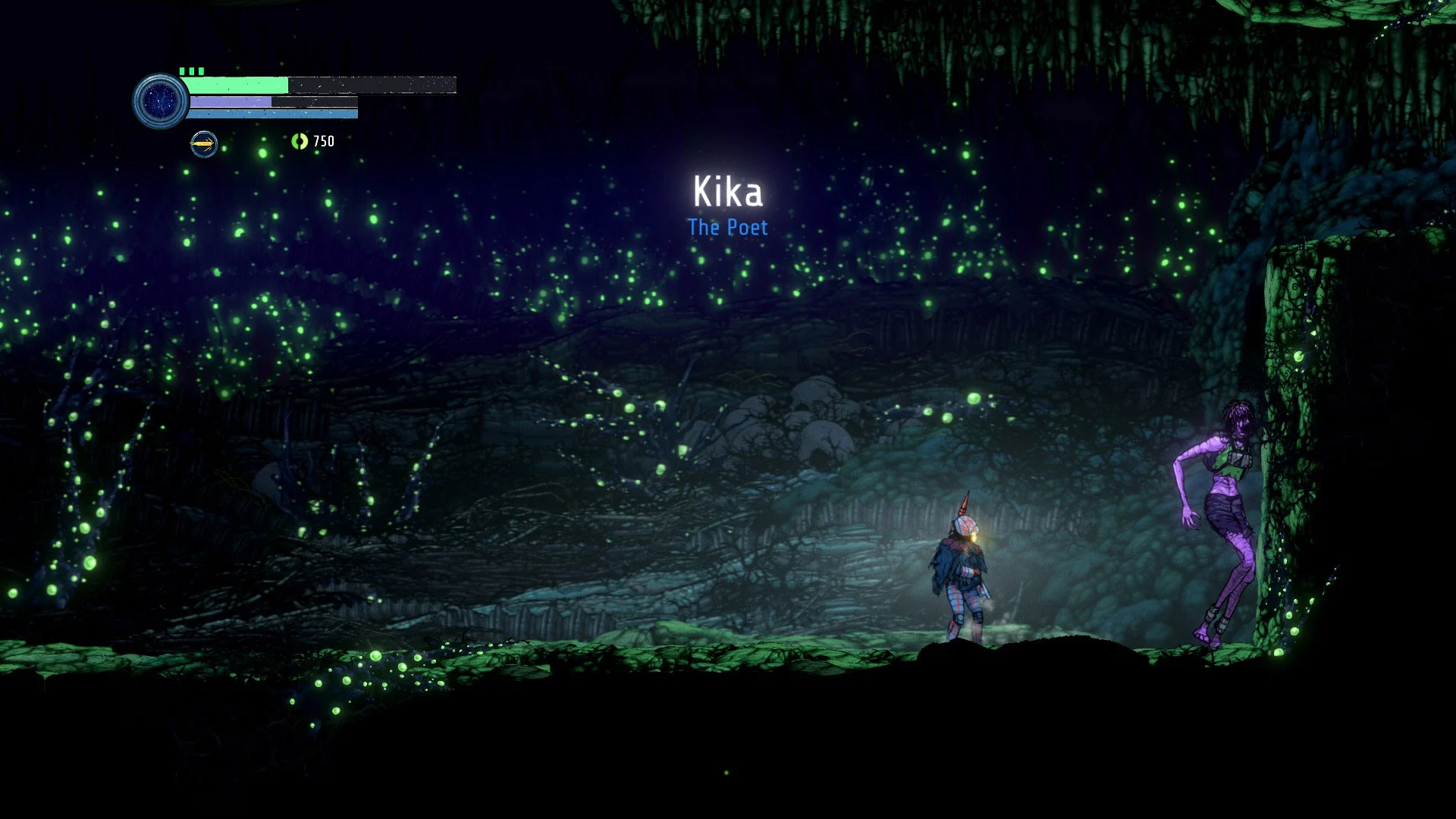
The music is as capable as the environment and enemy design in building a forgotten world. There are games that hit me harder emotionally, but Ghost Song is on my A-list largely because of the music. I’m amazed at the variety they have in the “sad but beautiful” department of tracks. I’d gotten used to that running theme, only to stop when I first reached Stumbledeep. I took my hands off the keyboard, breathing in the atmosphere, just for a minute. The composer covers other emotions, too; I especially liked the agitated ambiance of Roteshotter.
A Couple Missed Jumps
As much as I adore this game, it isn’t perfect. There are rough edges scattered throughout that wear on my enjoyment. They ultimately have me hoping for another entry (or even expansion) where the developer has learned from these missteps.
I appreciate breadcrumb storytelling; I like the feeling of piecing notes and conversations together. I’ve seen it done better, though. There’s very little that is explicitly told to the player, which on its own isn’t a problem. Ghost Song also lacks (much) flavor text for items or equipment or even loading screens. If the developer had better used these channels to explain the world, my next issue would have been avoided.
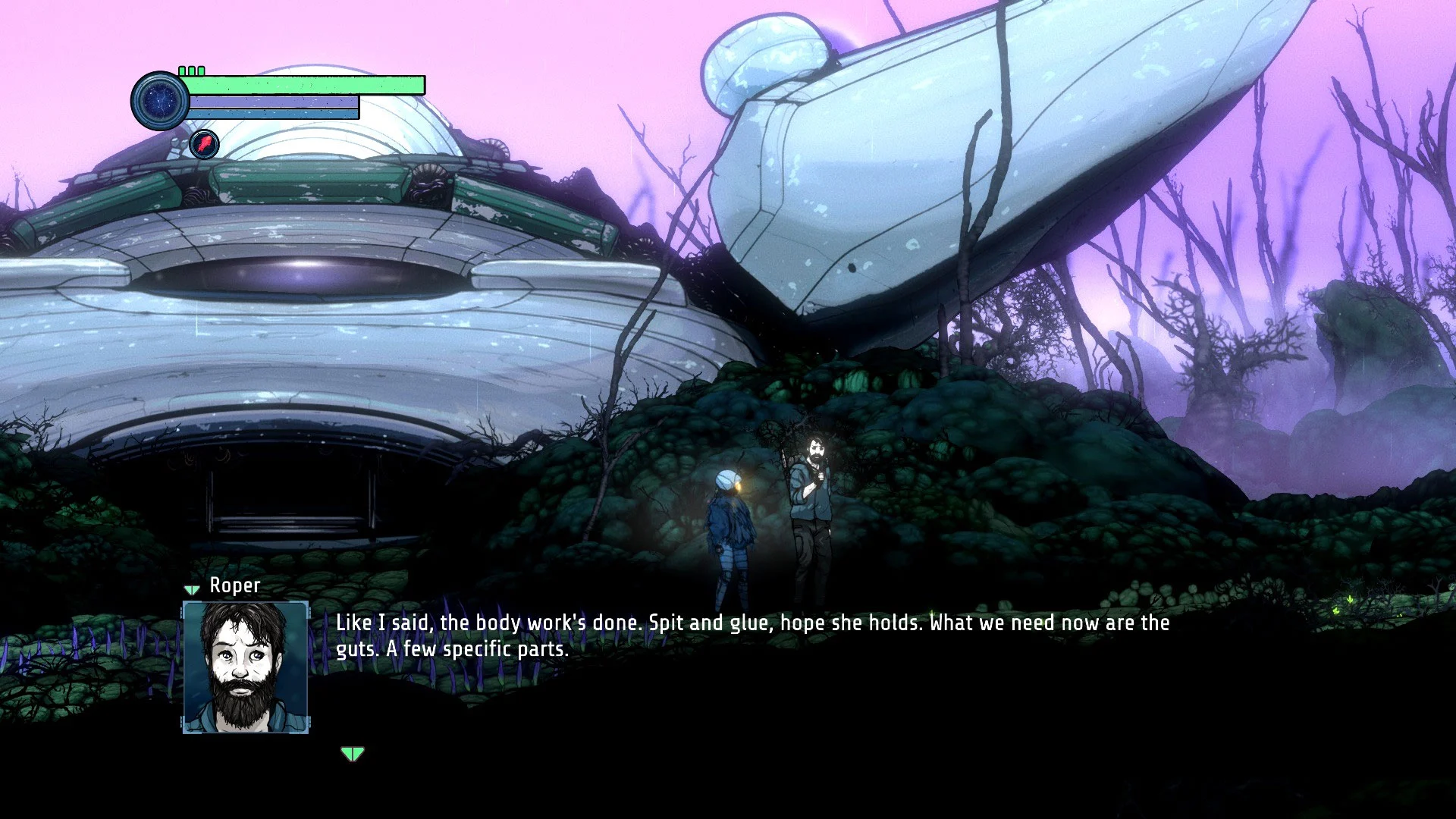
There’s a big exposition dump toward the end of the game. It feels like the developer lost their nerve at the last moment. Even though the game’s biggest mystery remains unsolved if players don’t go exploring 1 more time before the finale. I want more of that confidence. The sort that packs entire bosses and weapons behind breakable walls but trusts players to find them.
It’s a little tricky to advance some of the NPC stories too. I didn’t know you could talk to Mutt in more depth because the “speak” prompt was slightly out of place, and I was not the only one struggling with his quest line either. Which is a shame because it’s one of my favorites, leading to an intense fight with the Roslock featured nowhere else.
The combat system has unexplored potential. There are weapons with novel effects that are too weak to use in practice. There are extra damage types that only matter once or twice in a run. And one too many bosses are standard enemies with an extra move and a bigger health bar. In a bigger game, these are fine, but Ghost Song needs more memorable fights. The Roteshotter area had me convinced some giant ‘Queen’ version of the bugs I was seeing would ambush me on my way out, but it never happened.
Final Verdict
Ghost Song is a competent platforming game with a somber atmosphere and engaging writing. The developer has created a mysterious and hostile world that is fun to explore, both for fighting the monsters and meeting the people that remain.
The difficulty is challenging but not grueling, and the mechanics most likely to cause frustration can be avoided with the alternate difficulty setting. It’s a little on the short side for its genre, but the resulting polish is worth the trade-off.
Ghost Song Review
Good
Ghost Song is a competent platforming game with a somber atmosphere and engaging writing. The Souls-like additions can be frustrating, but the result is an enjoyable adventure that doesn’t overstay its welcome. Ghost Song is an excellent first showing by Old Moon, and I hope for more from them in the future.
You can purchase Ghost Song on Steam.
See our Review Policy Here.
[Reviewed on PC]

